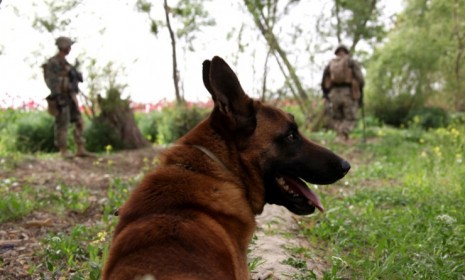The 'disturbing' effects of war on military dogs
German shepherds and Labrador retrievers returning from war suffer from post-traumatic stress syndrome — just like their human handlers

A free daily email with the biggest news stories of the day – and the best features from TheWeek.com
You are now subscribed
Your newsletter sign-up was successful
Humans aren't the only ones to bear the emotional scars of war. The New York Times reports that veterinarians are now recognizing and treating post-traumatic stress disorder (PTSD) in dogs that have been deployed with combat forces. More than 5 percent of military dogs who've seen action may be affected, and roughly half of the damaged animals will have to be retired. Here, a brief guide to the "disturbing" effects of war on our loyal, four-legged soldiers:
What is canine PTSD exactly?
With PTSD in canines, as in humans, the symptoms vary but typically involve a marked change in temperament and character. Some dogs become overly vigilant, others get "unusually aggressive with their handlers," while still others become shy and needy. "Most crucially," says James Dao in The New York Times, "many stop doing the tasks they were trained to perform." It's only in the last 18 months that vets have begun recognizing and treating the concept of PTSD in dogs — which is a "bit surprising," says Margaret Hartmann at Jezebel, given how long we've known that abused dogs tend to cower and act out.
The Week
Escape your echo chamber. Get the facts behind the news, plus analysis from multiple perspectives.

Sign up for The Week's Free Newsletters
From our morning news briefing to a weekly Good News Newsletter, get the best of The Week delivered directly to your inbox.
From our morning news briefing to a weekly Good News Newsletter, get the best of The Week delivered directly to your inbox.
How much of an issue is this?
A big one. Once merely "furry sentries," military dogs have become increasingly important in modern warfare. German shepherds, Belgian Malinois, and Labrador retrievers now perform various specialized tasks, such as sniffing out improvised explosive devices (I.E.D.'s), the leading cause of casualties in Afghanistan in recent years. "If the dog is trained to find improvised explosives and it looks like [the dog is] working, but isn't, it's not just the dog that's at risk," says Dr. Walter F. Burghardt Jr., the chief of behavioral medicine at the Daniel E. Holland Military Working Dog Hospital in San Antonio, Texas. "This is a human health issue as well."
How is it treated?
Treatment can be challenging since dogs can't tell vets and handlers what's bothering them. Mild cases of PTSD can often be treated by giving the dog a break, some extra playtime, and a gentle brush-up on obedience training. Dogs with more serious cases require "desensitization counterconditioning," wherein a dog is exposed to sights and sounds, like an explosion or a loud vehicle, from a comfortable distance. If the dog doesn't react, he's given a treat, and then progressively moved nearer to the action. Controversially, some dogs also receive the sort of anti-anxiety medications humans rely on (e.g. Xanax). "There's a disturbing undertone" here, says Hartmann. These "dogs are all forced into service, and in addition to risking their lives, they're suffering from psychological trauma they can't explain [and which] we don't quite know how to treat."
A free daily email with the biggest news stories of the day – and the best features from TheWeek.com
Does the treatment work?
It can. Gina, a five-year-old German shepherd with the 21st Security Force Squadron, made news last year after she returned from a five-month-tour in Southwest Asia and wasn't herself. "She was so messed up, she didn't want to see anybody," says one of her handlers. "She didn't want to go inside buildings. She was terrified of everything." After a successful desensitization treatment, Gina's been cleared to deploy again. A Labrador that was left scared and cowering after witnessing a firefight was given Xanax and cleared to work again within days. Still, vets stress that PTSD can likely only be managed and treated, not cured. "Dogs never forget," says Dr. Nicholas H. Dodman, director of the animal behavior clinic at Tufts University.
Sources: Jezebel, New York Times, U.S. Air Force